Ocean Park
Ocean Park is an amusement park on Hong Kong Island, but it's like a combination of Six Flags, Seaworld, Monterey Bay Aquarium, the zoo, a local haunted house, and a country fair.
It's got a few roller coasters, a log ride, a dolphin show, a couple of pandas, an aviary, a shark tank, and a gondola that connects the two parts of the park.
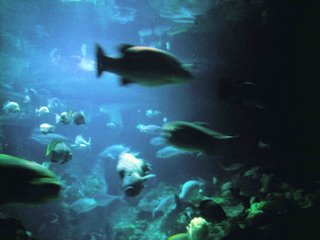
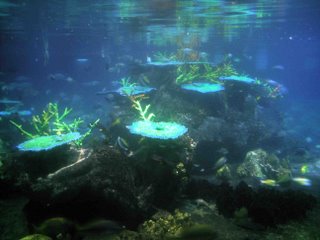





The last two pictures here come with commentary. First, there are opportunities to take pictures everywhere. Not only on the skyway, or on the log ride just as everyone is getting wet, but also in the aquarium. Professional photos. Just stand here by this blue screen. Will just take a few minutes, and by the time you are leaving we will be willing to sell you many copies of you standing in front of a picture of fish.
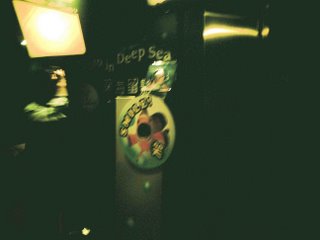
The other thing is the food. Pretty standard carnival-style stuff, really, except since this is Hong Kong, you have to have seafood. Here's Mr. Squid. This is the one next to Raging River (the log ride). It was closed when I took this picture, but normally you get seafood here.
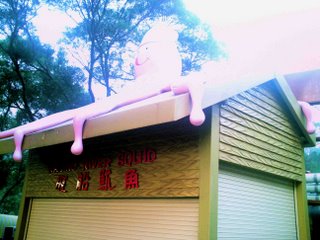
Incidentally, the aquarium had a neat collection of seahorses. It had helpful signs describing their weird life (the male is the one who carries the eggs, for instance) and signs directing you as to how to help preserve this wonder. It doesn't say not to eat it. It says to "minimize your intake" of seahorse to times when you need it medically. Minimize your intake of seahorses. Really.
So THAT'S why the Beijing dogs are small
A blurb in the South China Morning Post today (Wed. Nov. 15):
"The Beijing municipal government issued a circular last week outlining a ban on dogs taller than 35 cm in nine central districts and limiting ownership to one dog per household. Reports and photos documenting seizures and gruesome killings of dogs by police have been circulating over the internet in the past few days. Up to 500 dog owners staged a violent demonstration at Beijing Zoo at the weekend against the measures."
Apparently the regulations have been in place for awhile, but the authorities are now "seeking to persuade" owners to comply. Protesters claim the crackdown has been quite severe.
We did notice that the dogs in Beijing were typically very small. Though it was also clear that a few people were not abiding by the one-dog policy.
The article ends with the following quote by Bao Suixian, deputy head of the Public Security Management Bureau:
"Authorities everywhere are pushing standard behaviour for raising dogs, and I think this programme still needs to be carried out in accordance with the law, scientifically and orderly."
uh...
standard behaviour for raising dogs?
Lantau island
Lantau Island is where the airport is (the new one--the old airport was near HKBU and planes had to take off on short runways and land among highrise buildings). It's also the location of a massive Buddha--the largest metal seated Buddha (apparently there are stone standing ones carved, Mt. Rushmore-like, in other places).
You get to the massive Buddha at Ngohn Ping via a gondola on a cable, like in Disneyland (there's a Disneyland on Lantau Island, too, but I didn't visit it):
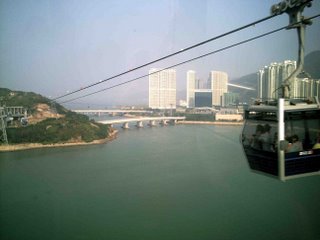
Actually, like Disneyland, they put you in a line, which prepares you for another line, and so on, until you finally get on the skylift.
And it puts you in a pseudo-ancient Chinese village (with modern restaurants and shops):
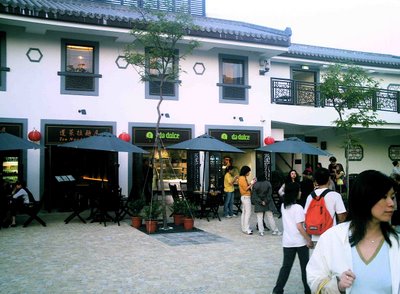
You are next greeted by a big pot
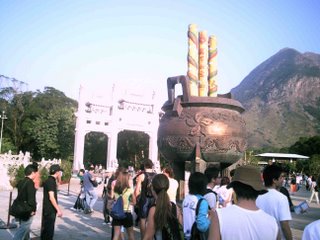
and finally the long flight of stairs to the Buddha:
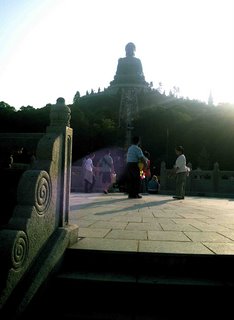
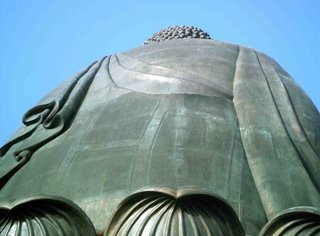
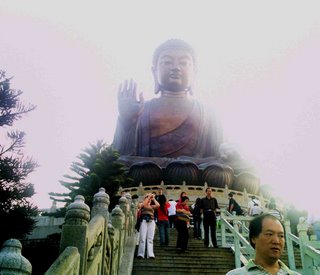
Inside, there are memorial plaques for the deceased. Buddhism here (as in Japan) is a lot about the deceased:

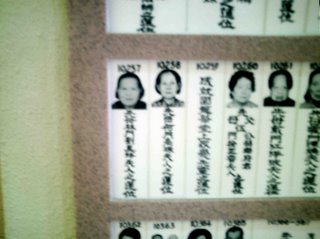
There's a monastery nearby. Most of the pictures I have of that didn't come out well, but here's us having fun, posing with some Buddhist ancients:
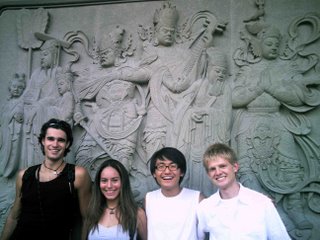
I should mention that this whole complex is pretty new, as is the big Buddha: they're maybe 10 or 20 years old or so. The monastery itself might be older, but the current buildings are fairly recent.
Hong Kong has a lot of open space. It's a surprise, given how crowded it is. But the government has been very careful about this. The government actually historically owned almost all of the land, and it leases and sells little bits for income. This encourages the government to be very cautious about selling land--it's its future livelihood.



















